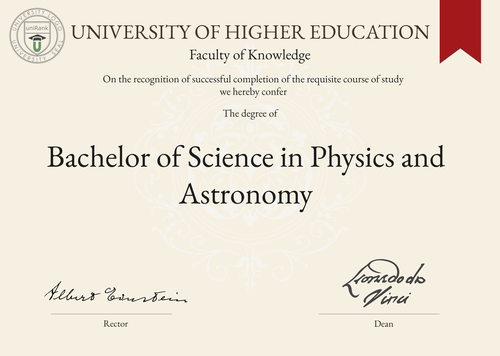
Bachelor of Science in Physics and Astronomy (B.Sc. in Physics and Astronomy)
Guide to Bachelor of Science in Physics and Astronomy Program/Course/Degree
Bachelor of Science in Physics and Astronomy (B.Sc. in Physics and Astronomy)

Program Name:
Bachelor of Science in Physics and AstronomyProgram or Degree abbreviation:
B.Sc. in Physics and AstronomyDuration range:
The duration of the program typically ranges from 3 to 4 years.Tuition range:
The tuition fees for the program can vary depending on the country and university. It is recommended to check with specific institutions for accurate information.Overview:
The Bachelor of Science in Physics and Astronomy program provides students with a comprehensive understanding of the fundamental principles and theories in physics and astronomy. It combines theoretical knowledge with practical skills to prepare students for a wide range of career opportunities in research, academia and industry.Curriculum Overview by year:
- Year 1: Introduction to Physics, Calculus, Mechanics, Electromagnetism - Year 2: Quantum Mechanics, Thermodynamics, Optics, Astrophysics - Year 3: Particle Physics, Stellar Structure, Cosmology, Computational Physics - Year 4: Advanced Topics in Physics and Astronomy, Research ProjectKey Components:
The key components of the program include theoretical and experimental physics, astrophysics, quantum mechanics, computational physics and research methodology. Students also gain proficiency in mathematical and analytical skills necessary for solving complex problems in the field.Career Prospects:
Graduates of the program can pursue various career paths, including research scientist, astrophysicist, data analyst, aerospace engineer, science writer and educator. They can work in research institutions, universities, government agencies, observatories and private companies.Salary Expectations:
The salary expectations for graduates of the program can vary depending on factors such as job position, location and level of experience. Generally, individuals with a Bachelor's degree in Physics and Astronomy can earn competitive salaries, with the potential for higher earnings as they advance in their careers. For a more accurate understanding of salary expectations, you can utilize the Job Sites Search Engine, from our sister site jobRank, which searches over 4,600 job sites worldwide. Make sure to specify not only the job title but also the country you are interested in.Conclusions:
It is important to note that the duration, tuition fees, curriculum, key components, career prospects and salary expectations of the Bachelor of Science in Physics and Astronomy program can vary based on the chosen country or location for studying the program, as well as the chosen university. Prospective students are advised to research and compare different institutions to find the best fit for their academic and career goals. Visitors can search for where this specific degree, B.Sc. in Physics and Astronomy, is offered anywhere in the world through the uniRank World Universities Search Engine.World Universities Search Engine
search for Bachelor of Science in Physics and Astronomy (B.Sc. in Physics and Astronomy) and add the Location (country, state etc.) or specific University you are interested in studying at.
Query examples:
- Bachelor of Science in Physics and Astronomy (B.Sc. in Physics and Astronomy) United States
- Bachelor of Science in Physics and Astronomy (B.Sc. in Physics and Astronomy) United Kingdom online
- Bachelor of Science in Physics and Astronomy (B.Sc. in Physics and Astronomy) Australia international students
- Bachelor of Science in Physics and Astronomy (B.Sc. in Physics and Astronomy) University of California
- Bachelor of Science in Physics and Astronomy (B.Sc. in Physics and Astronomy) University of London tuition fees
- Bachelor of Science in Physics and Astronomy (B.Sc. in Physics and Astronomy) University of Sydney scholarships
Share Program/Course
Interesting? Share this program/course/degree info with your friends now.